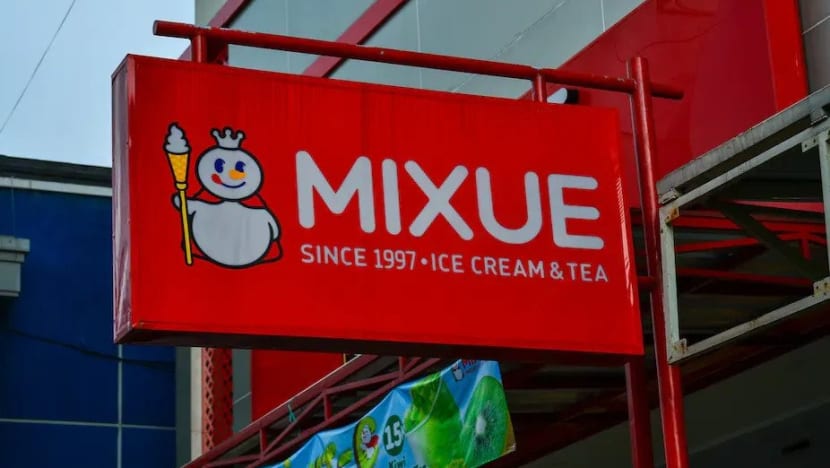Commentary: Why Chinese F&B companies are expanding in Indonesia
Newcomer food and beverage brands from China are surging in some Southeast Asian markets like Indonesia, say ISEAS - Yusof Ishak Institute researchers.

SINGAPORE: In the past decade, China’s food and beverage (F&B) firms have started large-scale investments outside China, driven by domestic market saturation and the Xi Jinping government’s “going out” policy.
Southeast Asia has become a prime target for this expansion due to its rapidly growing consumer base, underdeveloped F&B industry, proximity to China, and generally open investment environments. Given the variety of F&B industry offerings, mainland Chinese multinational enterprises (MNEs) are targeting market niches like ice cream and milk tea.
Prominent mainland Chinese F&B firms founded in cities like Xiamen and Shenzhen are now expanding in the region, such as Mixue Ice Cream and Tea (Mixue Bingcheng), Naixue (formerly Nayuki, also known as Naicow), Joyday (Yili Product), Chagee and Luckin Coffee.
However, they face competitors including earlier entrants from the US, Europe, Japan, South Korea and Taiwan, which benefit from strong brand recognition and deep-rooted consumer trust.
A DIFFERENT MODE OF ENTRY
The mainland Chinese companies’ mode of entry is quite different from American business franchise models, such as Starbucks and Coffee Bean & Tea Leaf, which are typically owned by large local conglomerates.
Franchisees in local markets bid for franchise outlets from the master franchise holder: for instance, the franchisee is PT Mitra Adiperkasa (MAP) for Starbucks Indonesia. This model is more exclusive and arguably caters to middle and upper-income segments in urban markets.
Meanwhile, mainland Chinese F&B firms offer a low-cost franchise model, extending their reach to non-urban areas. This model disrupts the traditional model, which requires high initial capital and can be highly exclusive.
With an initial capital of less than US$40,000, a Mixue franchise business is accessible to many aspiring entrepreneurs in the region.
Among the incoming mainland Chinese F&B brands, Mixue is arguably the fastest-growing in terms of the number of outlets in Southeast Asia. Founded by Chinese businessman Zhang Hongchao in the late 1990s, Mixue first entered Southeast Asia via Vietnam in 2018 and Indonesia in 2020.
Expansion into other Southeast Asian markets has been more modest, but sharp growth has occurred in economies with relatively lower income per capita and a significant young population (Vietnam and Indonesia).
Its growth in Indonesia has been striking – in the first two years, Mixue opened 317 stores; within four years, this exceeded 2,000. In Vietnam, Mixue opened approximately 1,000 stores in five years.
SIGNIFICANT BARRIERS
Initially, mainland Chinese F&B firms sought to enter developed countries’ markets but encountered significant barriers. Regulatory complexity, stringent food safety standards, higher entry costs, and the presence of well-established local and multinational brands hindered the Chinese firms’ penetration into developed markets, like Australia, South Korea and Japan.
In Japan and South Korea, there is also strong "local brand nationalism" or loyalty, making it harder for foreign brands to penetrate their domestic market.
In contrast, certain markets in Southeast Asia offer more receptive business environments. Their ice cream and F&B sectors have considerable room for growth.
Mixue’s rapid expansion in Indonesia can be attributed to three key factors: its efficient supply chain, affordable product pricing, and the ease of launching a franchise. Mixue’s model enables rapid expansion by relying on a network of low-cost, standardised outlets that are attractive to local entrepreneurs.
As Indonesia has the world’s largest Muslim population, halal certification is a prerequisite for most F&B businesses operating there. In January 2023, Mixue faced protests from Islamic groups in Jakarta, who questioned the halal status of its products and asked for a boycott.
In response, Mixue’s management immediately clarified that their ingredients did not contain lard or alcohol and emphasised that the company had applied for halal certification in 2022.
The Majelis Ulama Indonesia (the Indonesian Ulema Council, MUI), the authority in charge, did not initially respond. This prompted public criticism of bureaucratic delays, which can discourage foreign investment. Shortly after, MUI granted Mixue a halal certificate.
MANY OTHER PLAYERS
Before Mixue’s rapid expansion, a few other players had made inroads into Indonesia. Aice Group, established in Singapore in 2014 by new Chinese migrant Wang Jiacheng, founder and CEO, entered Indonesia in 2015.
Aice gained popularity by selling low-cost ice cream products tailored to Indonesian tastes. By 2022, Aice had become one of the largest F&B firms in Indonesia, operating with three large-scale factories in Cikarang, West Java; Mojokerto, East Java and North Sumatra.
Meanwhile, Yili Group, a major Chinese player, entered the market through its Joyday Ice Cream brand, thus directly competing with Aice and Mixue.
The regulatory climate in Indonesia has largely supported F&B investment, particularly for firms able to adapt to local requirements, such as halal compliance and pricing sensitivities.
SHAPING PERCEPTIONS OF CHINA
While competition is fierce, some of the Chinese firms have localised their supply chains and adapted branding and distribution models to align with Indonesian consumer preferences.
As Chinese F&B brands gain popularity, they might be shaping perceptions of China. In July 2023, a piece in The Jakarta Post commended Mixue’s contribution to Indonesia’s economy, noting its job creation, affordability, and resilience during economic downturns.
The article argued that while “negative perceptions of China may not be entirely eliminated by popular cheap food”, brands like Mixue demonstrate that local communities can view positively aspects of China’s presence.
This reflects the broader soft power potential of Chinese consumer brands, particularly in a culturally sensitive sector like F&B.
The sustainability of the Chinese low-cost franchise model remains to be seen. It is effective for quick market penetration, as evidenced by the rapid growth of retail outlets.
However, there is no openly available evidence that such growth is associated with profitability. The Chinese F&B business model will face serious tests related to quality control and market saturation as competition heightens.
Leo Suryadinata is a Visiting Senior Fellow, ISEAS – Yusof Ishak Institute and Adjunct Professor at S Rajaratnam School of International Studies,NTU. Siwage Dharma Negara is Senior Fellow and Coordinator of the APEC Study Centre, ISEAS - Yusof Ishak Institute. This commentary first appeared on ISEAS - Yusof Ishak Institute's Fulcrum.










.jpg?itok=mO9f_7i3)







